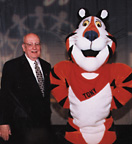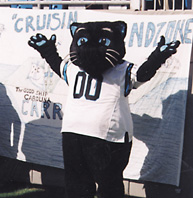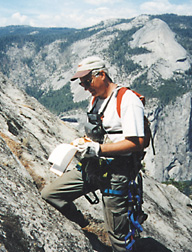Chao inducted into national engineering academy
Kellogg's says Sergeant '40 is greaaattt!
Former Hokie Birds prowl as cats
Alumna named rear admiral
Watts '74 rises to fame in a landslide
Quintessential Brass back for McComas tribute
Charles Johnson '97 still in limbo
Light-weight in category only
Who is Hokie Man?
![]()
Chao inducted into national engineering academy 
Edmund Y.S. Chao (agricultural engineering '64) was inducted into the prestigious National Academy of Engineering last fall.
Chao is a professor and vice chair for research in the department of orthopedic surgery at Johns Hopkins University in Baltimore. His induction was in honor of 30 years of development of rigorous biomechanical models for functional analysis of human limbs and limb-salvage procedures in cancer patients, according to the academy.
He joined the faculty at Johns Hopkins in 1992 after 20 years at the Mayo Clinic in Rochester, Minn.
Chao was among 84 people inducted into the academy in 1998.
Back to Contents
Kellogg's says Sergeant '40 is greaaattt! 
William Sergeant (general science '40) thought he retired a few years ago when he left the Atomic Energy Commission. It turns out his work was just beginning. His volunteer work as chairman of Rotary International's PolioPlus committee earned him the Kellogg Foundation's Hannah Neil World of Children Award in November.
Now living in Knoxville, Tenn., Sergeant travels around the globe in his attempts to eradicate polio. Since a polio vaccine was introduced, Rotary International has raised more than $300 million toward the goal of totally eliminating the disease. Sergeant hopes to attain this goal by 2005. Rotary collaborates with UNICEF, the Center for Disease Control, and the World Health Organization in the international effort.
Sergeant travels to third-world countries throughout the year to administer the vaccine and organize national immunization days. The PolioPlus Committee has been responsible for providing vaccines for more than one billion children.
Sergeant says there are currently no known cases of polio in the Western Hemisphere. Since 1988, the number of polio cases globally, now under 5,000, has been reduced by 90 percent. Most are in India and Africa. Until the disease is wiped out, all children need to be given a complete treatment of six doses of the oral drug, which costs about $3.
The $50,000 award from Kellogg's and the Hannah Neil World of Children is intended to be an international equivalent to the Nobel or Pulitzer prizes, say Kellogg officials, and is targeted specifically for those who help children.
Back to Contents
Former Hokie Birds prowl as cats
 |
Virginia Tech alumni Todd Maroldo (marketing management '97) and Curtis Dvorak (communication studies '96) found careers in a very limited field--professional sports mascots. Only a few dozen people hold paid mascot positions, but Maroldo and Dvorak parlayed their experience as Tech's Hokie Bird into dream jobs.
|
 |
| Curtis Dvorak '96 is the Jacksonville Jaguar mascot. |
Todd Maroldo '97 has been reincarnated as Sir Purr for the Carolina Panthers. |
Dvorak's originality and entertaining program won the 1996 National Cheerleading Association (NCA) championship. He is now the first Jacksonville Jaguar mascot, Jaxson deVille. Maroldo succeeded Dvorak and also won an NCA title, in 1997, as best collegiate mascot. This year, he became the man in the suit of Sir Purr, the Carolina Panthers' mascot.
The life of a professional mascot is much different from its collegiate counterpart, they say. Planned skits, an older audience, and constant requests for outside appearances make the hours longer and the antics tamer.
"You sweat everyday," says Dvorak, who prefers wearing a cat suit at work to a pinstripe suit. "If you love what you do, it's not work." Maroldo agrees. He was offered two positions in the corporate world the same day Carolina called.
Back to Contents
Annette C. Brown (management '73) was selected last summer to become the 27th woman to ascend to the rank of rear admiral, lower half, in the U.S. Navy. She is one of only five female rear admirals in her specialty, shore station expert.
A rear admiral of the lower half designation ranks fourth in the U.S. Navy's chain of command, following only rear admiral upper half, vice admiral, and admiral.
Now stationed in Crystal City, Va., near the Pentagon, Brown works as an advocate for sailors, providing Navy brass with a "reality check," she says, on how policies will affect the men and women at sea, on base, and as family members. "Taking care of sailors is my No. 1 responsibility," Brown says.
Brown held three command positions, including the base commander's post at Naval Station Everett, in Everett, Wash., prior to her latest assignment.
Brown enlisted in the Navy and completed officer candidate school after graduating from Tech. "I went in to serve four years, and here I am 24 years later," she says.
Back to Contents
Watts '74 rises to fame in a landslide 
Radford University geology professor Chester "Skip" Watts (geology '74) was hanging on a climbing rope 1,800 feet above the valley floor in Yosemite National Park during a shoot with the crew of a Learning Channel show when his cell phone rang. National Public Radio's Scott Simon wanted to interview Watts about his specialtyrockslidesfor Weekend Edition's 17 million listeners.
Watts was examining the cause of a 1996 rockslide that killed one park visitor and injured 14. The cable television program, Earth's Fury, that documented his expedition has aired on TLC twice during the past eight months.
Unlike most rockslides, where rock collects below the breaking point, the 65,000-ton mass at Yosemite fell onto a smooth ramp of granite a quarter-mile above the valley. The rock was launched into the sky, displacing the air underneath it. The compressed air that rushed from the falling rock at more than 100 mph felled at least a thousand trees.
"Yosemite's extremely steep granite walls make it virtually a rock slide laboratory," Watts says. "Small slides are common, but this one was truly amazing and catastrophic."
He assembled a team that included a graduate student, a geologist from the U.S. Geological Survey, and two professional rock climbers to assault the 2,000-plus foot cliffs.
Back to Contents
Quintessential Brass back for McComas tribute 
Starting a student-run chamber ensemble in 1988 was no easy task--until Virginia Tech's new President McComas began finding opportunities for the Quintessential Brass Repertoire to perform. Over time the QBR, as they were known, became Tech's musical ambassadors and performed at EXPO events to recruit new students and for dignitaries visiting Tech.
When Tech's new fitness and health center, McComas Hall, was dedicated last fall, the group came down from Northern Virginia to perform. QBR still performs regularly in the Washington, D.C. area. Original members David Welch (industrial and systems engineering '91), Charles Peterson (MBA '91), and Kevin Dunetz (electrical engineering '90), are joined by Ron Foster of the U.S. Marine Corps Band and Bill Gray of the U.S. Navy Band.
Back to Contents
Charles Johnson '97 still in limbo 
Charles Johnson (agricultural economics '97), who was featured in this section of the summer issue, thought he had beaten cancer. A few months ago, he got bad news--the cancer had spread to his bone marrow.
Johnson was working on his teaching certificate after graduating from Virginia Tech when he was first diagnosed with lymphoma. He was not covered by any insurance policy. After his plight was revealed in the Virginia Tech Magazine dozens of alumni wrote notes of encouragement and contributed to the Charles Johnson Fund, set up by the nonprofit Agricultural Education Society to cover his medical expenses.
At press time, Johnson was scheduled to undergo a bone marrow cleansing at the University of Virginia Medical Center. In the procedure, Johnson's own marrow is harvested and cleansed, then he is dosed with radiation to kill the cancer; afterward, his own clean marrow is reintroduced. UVa agreed to waive $70,000 of the $100,000 charge, if Johnson could come up with $30,000 in advance. Students in the College of Agriculture & Life Sciences have been organizing fundraisers on Johnson's behalf.
"I am so grateful to the people associated with Virginia Tech who helped me," Johnson says. "Most were people who didn't know me, had never heard of me."
Back to Contents

This feat earned him the status of professional bodybuilder. It was the culmination of a dream Gaines had since he worked out with a set of weights his mother bought him at a department store when he was 16.
Although the purse for professional bodybuildering champions in steroid-free competitions is small, the benefits for Gaines' side business as a trainer are great. "My business as a personal trainer has doubled," Gaines says. "With professional status, people take you more seriously."
His full-time job is coordinating Virginia Tech's extramural sports programs while he works on his dissertation in human nutrition, foods, and exercise.
The competition was Gaines' seventh attempt at achieving professional status, a goal he almost dropped. But giving up is not in the nature of a man who gets up at 5 a.m. every morning for a training session that includes a seven-mile run and time in the weight room.
Back to Contents
In less than three years the Hokie Man has become an icon. In his cape, pompom skirt, and floppy hat, he leads cheers at Virginia Tech athletic events from Miami to Syracuse. No wind chill can stop him; no rain can dampen his enthusiasm for his beloved Hokies.
You can find him boosting spirit from the front row on Lane Stadium's section 16, in stadium parking lots, or on the pages of newspapers in Miami, Nashville, and Virginia Beach, his long black wig flying in the breeze.
But who is Hokie Man? Would Superman say he's Clark Kent? Would Spiderman fess up to being Peter Parker? Ask Hokie Man his identity, and all you get is "I am Hokie Man."
Here's the scoop. Hokie man is not a Tech undergraduate, as an ESPN commentator once suggested. Hokie Man is a member of the faculty. Hokie Man is the alter-ego of mild-mannered Mike Schroder (hotel, restaurant management '92), an assistant director for program development for Virginia Tech's Division of Continuing Education.
Hokie Man was born Nov. 9, 1996, when the Hokies chilled East Carolina in a nationally televised game that revealed snow blowing horizontally. Schroder was bare from waist up, save the cape draped over his shoulders. When he donned a sweatshirt at half-time, about a thousand people booed until he yielded to mob rule and removed it.
In the parking lot of the Orange Bowl weeks later, Schroder found himself leading an impromptu pep rally from atop a van. He's had a dual existence as a Tech administrator/pop-culure star ever since.
Becoming Hokie Man is no flash change undertaking; Schroder enlists the help of his wife Beth (hospitality and tourism management '94) to apply the body paint, which takes about 90 minutes. But it's worth the effort. Hokie Man is sponsored by Hokie House restaurant (where you can find a wall of his press clippings and pictures), and he's guaranteed a front row seat at Tech games.
Back to Contents
Home | News | Features | Research | Philanthropy | Alumni | Classnotes | Editor's Page